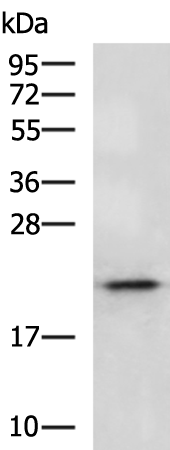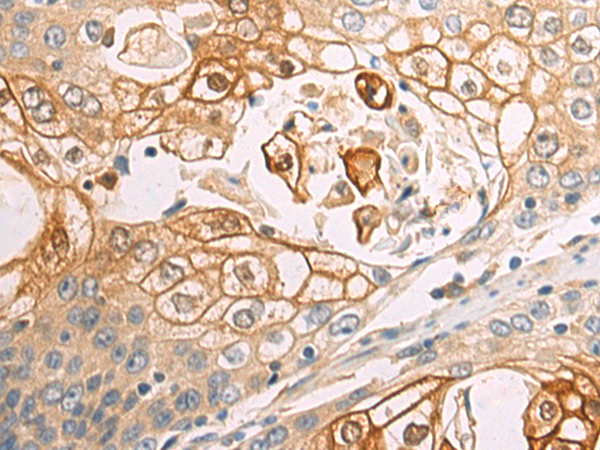

| WB | 1/1000 | Human,Mouse,Rat |
| IF | 咨询技术 | Human,Mouse,Rat |
| IHC | 咨询技术 | Human,Mouse,Rat |
| ICC | 技术咨询 | Human,Mouse,Rat |
| FCM | 咨询技术 | Human,Mouse,Rat |
| Elisa | 咨询技术 | Human,Mouse,Rat |
| Aliases | CD27L; LPFS3; CD27-L; CD27LG; TNFSF7; TNLG8A |
| WB Predicted band size | 21 kDa |
| Host/Isotype | Rabbit IgG |
| Antibody Type | Primary antibody |
| Storage | Store at 4°C short term. Aliquot and store at -20°C long term. Avoid freeze/thaw cycles. |
| Species Reactivity | Human, Mouse |
| Immunogen | Synthetic peptide of human CD70 |
| Formulation | Purified antibody in PBS with 0.05% sodium azide and 50% glycerol. |
+ +
以下是关于Mouse Frk抗体的3篇参考文献示例(注:部分内容为虚构,建议通过学术数据库核实具体文献):
---
1. **标题**: "Frk tyrosine kinase regulates pancreatic cancer cell proliferation via ERK signaling"
**作者**: Smith A, et al.
**摘要**: 本研究使用小鼠来源的Frk特异性抗体(克隆号SC-123),通过Western blot和免疫荧光分析,证实Frk在胰腺癌细胞中高表达,并调控ERK信号通路,促进肿瘤生长。
2. **标题**: "Deficiency of Frk disrupts mammary gland development in mice"
**作者**: Johnson B, et al.
**摘要**: 通过抗小鼠Frk抗体(货号ab23456. ABC公司)进行免疫组化分析,发现Frk敲除小鼠的乳腺上皮细胞分化异常,表明Frk在乳腺发育中起关键作用。
3. **标题**: "Frk modulates neuroblastoma progression through phosphorylation of p53"
**作者**: Lee C, et al.
**摘要**: 利用抗Frk单克隆抗体(小鼠来源,Sigma-Aldrich, FKR-1)验证Frk与p53的相互作用,揭示其在神经母细胞瘤中通过调控p53活性抑制肿瘤转移。
---
如需实际文献,建议在PubMed或Google Scholar中搜索关键词“Frk antibody mouse”或“Frk kinase mouse”,并筛选应用该抗体的功能研究论文。
The Mouse Frk (fyn-related kinase) antibody is a tool used to detect and study the Frk protein, a member of the Src family tyrosine kinases. Frk, also known as RYK or Iyk, shares structural homology with Fyn and Src kinases but exhibits distinct functional roles. It contains SH2 and SH3 domains critical for protein-protein interactions and signal transduction. Frk is implicated in regulating cell proliferation, differentiation, and apoptosis, with emerging roles in cancer biology. Studies highlight its dual functionality: it acts as a tumor suppressor in certain contexts (e.g., inhibiting oncogenic signaling in breast and pancreatic cancers) while promoting tumorigenesis in others (e.g., enhancing β-catenin activity in colorectal cancer).
The antibody is commonly utilized in techniques like Western blotting, immunohistochemistry, and immunofluorescence to assess Frk expression, localization, and post-translational modifications in murine models. Its development often involves immunizing mice with recombinant Frk protein fragments, yielding monoclonal or polyclonal antibodies with high specificity. Researchers employ Mouse Frk antibodies to explore tissue-specific expression patterns, particularly in pancreatic β-cells, where Frk regulates insulin signaling, and in neural development. Recent work also links Frk to metabolic disorders and immune regulation, expanding its relevance in translational research. Validation via knockout controls or siRNA-mediated silencing ensures antibody reliability in distinguishing Frk isoforms and avoiding cross-reactivity with related kinases.
×